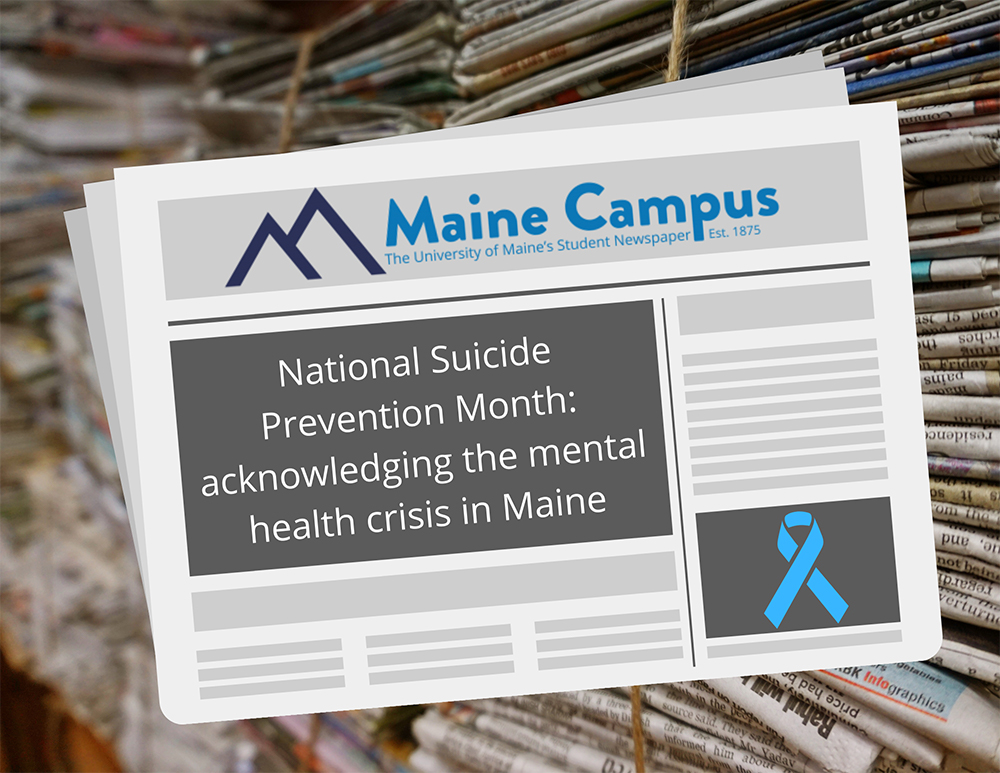Each year, approximately 47,500 people die by suicide in the United States. It is the tenth leading cause of death in the US and the second leading cause for those aged 10-34. Maine falls 20% above the national average and has the highest suicide rate in New England. On average, approximately 227 people in Maine die by suicide each year. These statistics alone are concerning, but the implications of the COVID-19 pandemic threaten to further exacerbate the mental health crisis in our state.
Maine’s unemployment rate reached its lowest at 2.6% in April of 2019. A year later, at the peak of lockdown, it climbed to 9.1%. It has since declined to 4.8% but still rests at nearly double the amount from two years prior. These statistics have concerning implications, both economically and socially. Businesses struggled to remain open during the pandemic and now face the challenge of recruiting a post COVID workforce. The service industry impacts Maine heavily, and these financial problems create additional mental health stresses for families across Maine and potentially threaten funding available for mental health resources.
While the pandemic hardships are slowly subsiding, we’re still grappling with their repercussions. Rising unemployment, lockdown restrictions, reduction in tourism, business closures, remote education and overall uncertainty were some of the problems faced by many during the pandemic. On top of Maine’s already high suicide rate, these conditions project a worrisome future for the overall mental health of our state. A particular group suffering especially is Maine’s youth. For persons aged 10-24, suicide rates rose 56% from 2007-2009 to 2016-2018. The pandemic lockdowns further isolated Maine youth through school closures, rising unemployment, and social distancing rules.
Anxiety, depression, and suicidal ideation have increased over the past year, and some of the hardest hit places are Maine’s small, rural counties. Washington county faced a devastating winter as they lost four people to suicide, including three young men. Barbara A. Walsh wrote her article, “The crushing toll of a pandemic in Maine’s ‘forgotten country’” for the Maine Monitor about the recent deaths.
“The suicides rattled one of Maine’s most impoverished counties, where the pandemic has crippled businesses, closed schools and spiked anxiety, depression and despair,” Walsh wrote.
Remote education, suspended school activities, social distancing and overall disruption have led to a generation susceptible to anxiety and depression. Even as the lockdown restrictions ease, adolescents remain robbed of significant years, milestones, and education.
Suicide devastates communites, leaving lasting scars on those affected. Unfortunately, most mental health concerns aren’t acknowledged in the preventable stages. Depression and anxiety are commonly stigmatized, and often those affected are afraid to reach out and struggle silently. Checking in on your friends, educating others on resources available, encouraging constructive conversations about mental health and partaking in community events are effective ways you can help combat the mental health crisis in Maine.
A major resource provided by the state is the Maine Crisis Hotline. They provide 24/7 access to professionally trained crisis workers and can be contacted by calling their number: 1-888-568-112. The National Suicide Prevention Lifeline provides similar services and can be reached at 1-800-273-TALK (8255). There is also an online service available for chatting with a crisis counselor on the site: www.suicidepreventionlifeline.org/gethelp/lifelinechat.aspx.
These are essential emergency resources that can save lives. Save these on your phone, and educate yourself on ways you can help should you or someone you know enter a crisis situation.
The American Foundation for Suicide Prevention offers resources and communities for those affected by suicide. They host annual Out of the Darkness community walks throughout the US. On October 2nd, they will be hosting a walk in Bangor with a goal of raising $15,000 for their suicide prevention program. These events also help families process the traumatic loss of loved ones, educate community members on resources and policies, as well as help to end the stigma surrounding mental health.
Looking forward, we must acknowledge the mental health crisis in our state and advocate for a preventative stance through policies, programs and education. We must work to identify those at risk of suicide and offer the necessary resources to help them recover. Mental health is just as real as physical health, and the threat it poses to our state should be taken seriously. Together we can strive to be a state that prioritizes mental health and fights to reduce the rising suicide rates.









